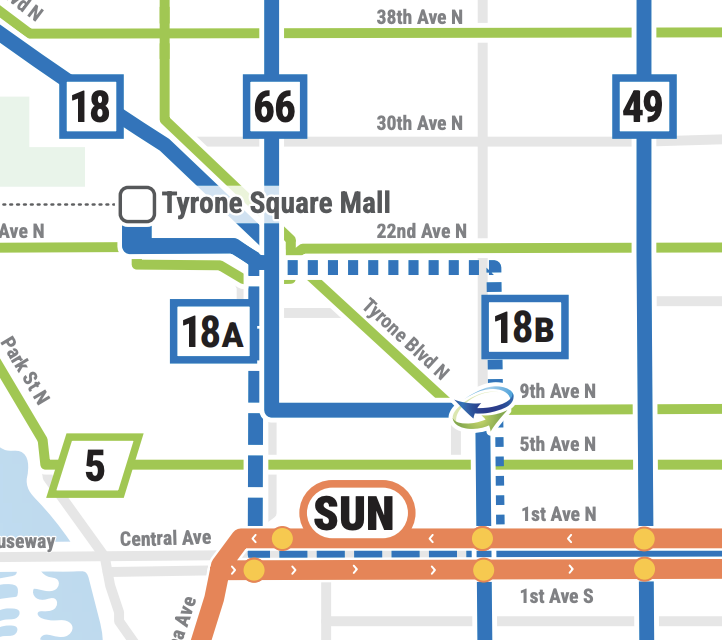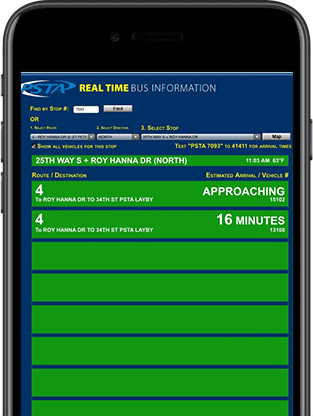In October, PSTA will embark on the largest redesign in the agency’s history, with the goal of improving overall services that optimize ridership and coverage. It’s been a long road to get here, and now we’re just about a month away!
Back in February 2025, we talked about the basics of why PSTA created the Connected Community Bus Network (CCBN) and how we collected community feedback at every stage of the process. This time, we want to spell out all of the improvements we’re making and explain how some of our new services will work.
We know change can be hard. But PSTA’s staff have worked tirelessly to create a system we believe will better serve the community, and we’re ready to guide you through these changes to ensure you understand exactly how our new bus system will benefit you!
High-Level Changes
The biggest changes coming to PSTA’s bus network include higher frequency on popular routes, easier transfers, route variants, and new on-demand zones, as well as the launch of our new premium bus service along 34th St S, called Spark.
Let’s talk about the details!
No-Transfer, One-Seat Rides
PSTA will be introducing timed transfers in downtown St. Pete, Park Street Terminal, and Largo Transit Center to speed up route locations. The following routes will reap the benefits of these timed transfers:
- Route 4: PSTA complex to Skyway Marina
- Route 9: South St Pete to Gateway Mall
- Route 38: Madeira Beach to Downtown St. Pete (partially serving existing Route 68)
- Route 65: Indian Shores to Seminole City Center
- Route 78: Park Street to Northwest Transfer Center (Tampa)
Variant Routes
Variant routes aren’t anything new to PSTA’s bus system. In fact, we currently have routes with variants. For example, Route 4 either stays on 4th Street or heads to Coquina Key—the bus simply conveys this by listing the destination on its headsign above the windshield. CCBN will now make variant routes more apparent by designating them with an A or B after the route number.
This change will not only make route destinations clearer to riders, but also follow transit industry standards that many other agencies use.
The following routes will now have A and B variants:
- Route 4
- Route 9
- Route 18
- Route 52
- Route 59
- Route 74
- Route 78
Frequency Changes
By adjusting the frequency of popular, high-ridership routes, many riders will see more consistent schedules and weekend improvements with 7-day-a-week service on most routes.
The following routes will undergo changes to their frequencies:
- Five routes now running with 20 minutes or less frequency: SunRunner, Spark, 4, 52, & 60
- Route 4 & 9: Sunday frequency improvement from 60 to 30 minutes on Sunday
- Route 52 (from Park Street to Largo Transit Center): Weekday frequency increase from 30 to 15 minutes
- Route 59: Weekday frequency decrease from 15 to 30 minutes
- Route 74: Weekday frequency decrease from 20 to 30 minutes
- Suncoast Beach Trolley & Jolley Trolley: Staggered schedules for 15-minute frequency on Clearwater Beach, 7 days a week
- Route 18 & 34 & 52: 30-minute frequency all day
Route Replacements
A number of today’s routes will now be served by routes of different names. These replacements will streamline many inefficient route paths that are simply past their prime. In order to better visualize these replacements, click here to view our new system map to see what areas these route replacements will serve.
The following routes will be replaced:
- Route 7: Replaced with Routes 9B & 29
- Route 14: Replaced with Routes 9A, 24, & 49
- Route 15: Replaced with Routes 9A & 66
- Route 23: Replaced with Routes 24 and 66
- Route 32: Replaced with Route 16 in Downtown St Pete
- Route 34: Replaced by the new Spark service
- Route 52LX: Replaced with local service on Routes 49 & 52
- Route 66L: Replaced with Route 91
- Route 68: Replaced with Routes 18, 38, & SCBT
- Route 75: Replaced with Routes 54 & 74B
- Route 76: Replaced with Route 70
- Route 79: Replaced with Routes 49, 66, & SunRunner or CAT
- Route 67 & 812: Replaced with Route 78
Stop Changes
PSTA has a significant number of bus stops—far more than most agencies of our size. A number of our stops experience low ridership and require the expenditure of resources from our Facilities team. Therefore, CCBN provided an opportunity to remove and add bus stops to fully optimize our existing roster of stops.
Click here to view our full list of bus stop additions and removals. Simply click on the route in the table of contents to navigate to the list of stops utilized by that route.
Our New System Map
Now let’s dive into our brand new system map. With so many changes, it was time to overhaul our existing system map and introduce some new symbols and colors to represent all the changes we’re making.

PSTA’s new system map, effective October 26th, 2025.
Let’s go through the details found in the map’s legend.
Route Types
Bus routes fall into one of six categories with distinct service types: Premium (20 mins or less), Frequent (29 mins or less), Local (30–59 mins), Community (60+ mins), Limited, and Trolley.

PSTA’s new system map legend.
Each of these types is notated by a shape and color—for example, Frequent routes are pink with a circle around the route number on the map. These colors and shapes denote the frequency, thus making it easier to very quickly understand which routes are most frequent compared to others.
Other services, such as Ferries, Direct Connect locations, and On-Demand Zones (don’t worry, we’ll explain those in a bit), also have their own symbols on the system map.
Variant routes are indicated on the map, with A variants shown as long dashed lines and B variants shown as short dashed lines.

Routes 18A and 18B shown on the system map with long dashed and short dashed lines, respectively.
Check out all the new individual route schedules and start planning your trip by clicking here.
New Services
As part of the new system redesign, PSTA is also launching two new services—Spark, a premium bus service running from Eckerd College to Grand Central Station, and Snapper, two On-Demand Zones in Clearwater and Safety Harbor.
Spark
Spark is a new premium, high-frequency bus service running along 34th St S between Eckerd College and Grand Central Station. The service will improve connections to the SunRunner for students, teachers, and faculty members at Eckerd College, which can take folks into the heart of Downtown St. Pete or to the sunny beaches of St. Pete Beach.
With this service stopping in Grand Central Station, riders can connect from the southernmost part of Pinellas to anywhere else in the county by transferring to other routes that layover in Grand Central Station.
Some highlights of Spark include:
- 15-minute frequency from 6am–8pm and 30-minute frequency from 5am–6am and 8pm–midnight
- Includes 18 upgraded stations with real-time bus information, shelters, and lighted totems
- Powered by a dedicated sub-fleet of all-electric buses
- Features both cash and cashless fare options for convenient front- or rear-door boarding (cash accepted at front door ONLY)
Snapper
Snapper is PSTA's new On-Demand family, providing transportation in and out of two special zones in Clearwater and Safety Harbor.
Snapper Clearwater will serve the following area, allowing riders to request a ride anywhere between this zone and Countryside Mall and Park Street Terminal.

Snapper Clearwater service area map.
Snapper Safety Harbor will serve the following area, allowing riders to request a ride anywhere between this zone and Countryside Mall.

Snapper Safety Harbor service area map.
The CCBN Roadmap
CCBN, with all the changes detailed in this blog, will go live on October 26th, 2025. Until then, we will continue adding information to the Connected Community Bus Network landing page as it becomes available. Our Outreach team will be out at the transfer centers and terminals, answering questions and helping riders understand their new commute.
In the coming weeks, Transit app will provide a Network Preview that allows you to plan your trip using our new bus system. Keep an eye on our social media account for updates on when that will become available!
We know big changes can bring uncertainty, but we are committed to helping each and every rider feel confident and informed with our new bus system changes. If you have any specific questions about how CCBN will affect your current favorite routes, email ccbn@psta.net, and a member of our Planning team will be happy to assist you. You can also call our InfoLine at 727-540-1900 for more information.


